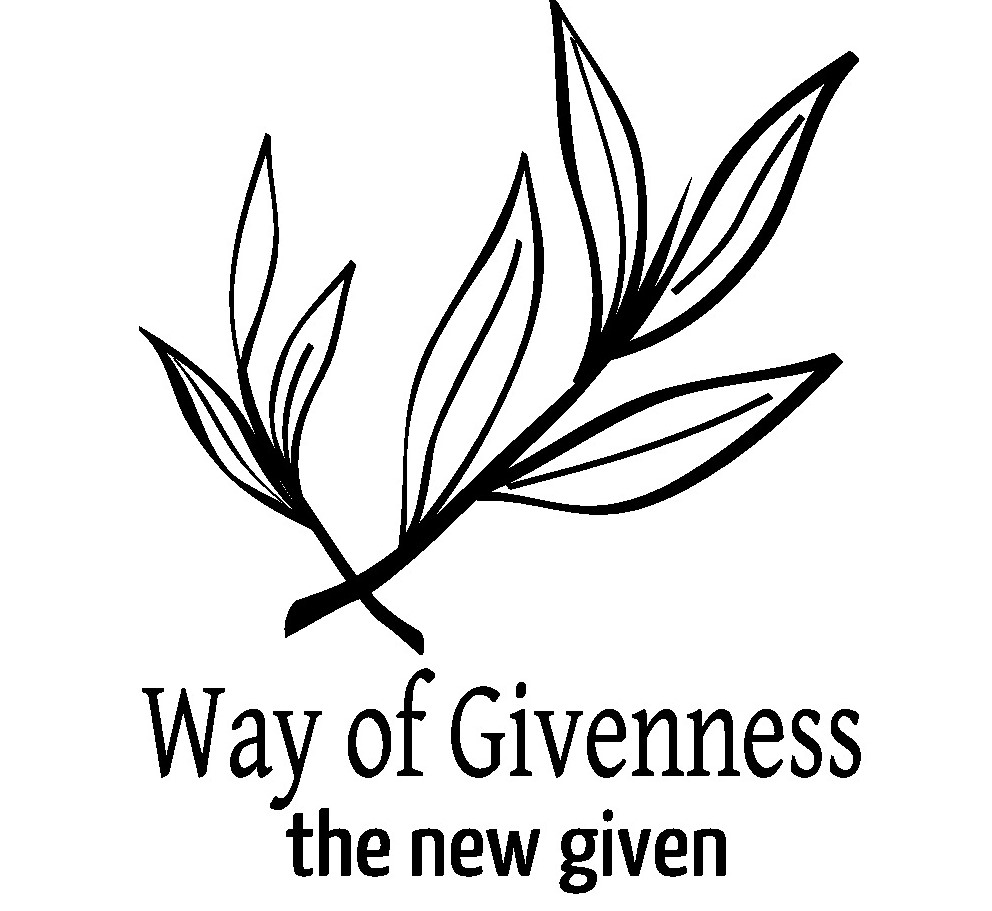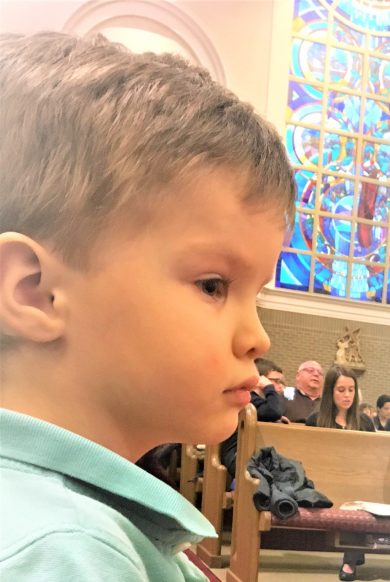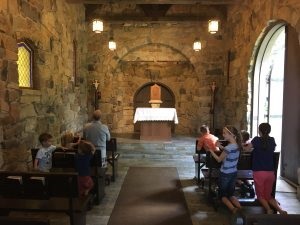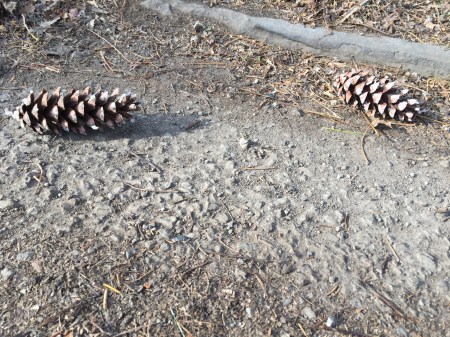- Home
- Daily Meditation
How to Stop Anxiety from Ruining Your Relationship with God
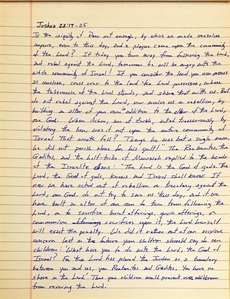
Joshua 22:17-25
Synopsis Joshua 22:17-25 5/24/2018
As the warriors from the tribes of Reuben, Gad and Manasseh returned from the conquest of the Promised Land, they built a memorial in the form of the altar of God. The other tribes of Israel viewed this with hostility and massed the military.
They sent the priest Phinehas as an envoy to speak with the Reubenites and Gadites and to warn them from creating an alternative system of worship to the one that God had instituted.
The Reubenites and Gadites answered that the memorial was not intended to be used as a place of worship. Its purpose was to memorialize for future generations the fact that the eastern tribes were, indeed, part of Israel.
Worry Leads to Isolation and Misunderstanding
The sudden realization that their choice to take the territory outside the Promised Land caused the Reubenites and Gadites to worry about their place in Israel. Joshua had referred to them as “allies” – a subtle distinction reinforcing the fact that their place in the nation was different because they lived east of the Jordan.
The Reubenites and Gadites were filled with anxiety. They imagined that they might somehow lose their place amongst God’s chosen people. They didn’t want this. So they built a memorial replica in the form of the altar of God. With this, they intended to eternally establish and commemorate their position within the tribes.
But their act resulted in reduced security. The other tribes didn’t understand the purpose of the altar memorial. They assumed the Reubenties and Gadites had conspired to begin their own sacrificial practice so that they were not dependent on the other tribes.
How to Stop Anxiety From Destroying Your Relationship with God
Anxiety is the experience of fear reactions in my body when nothing is actually threatening me. My sympathetic nervous system is activated. “Fight or flight” – but there’s nothing really to fight. And there’s nothing to run from. I’m filled with nervous energy and no clear sense of what I should be doing.
My mind and body have conspired to force me to think about failure even though there is nothing threatening my success. The whole experience is nothing other than some ideas swirling in my mind.
But for this condition, God has prescribed a way out. I call it “visit the worst case”. It works like this:
- Identify what is the object of the anxious thoughts.
- Imagine if the strangely improbable “worst case” actually came to pass.
- Ask yourself: Would you survive? Could you survive?
If they answer is yes, then there’s nothing to worry about – let it go.
If the answer is no, then recognize that your only hope is in God’s salvation.
“Therefore I tell you, do not worry about your life, what you will eat [or drink], or about your body, what you will wear. Is not life more than food and the body more than clothing?” Matt 6:25
Nostolgia Lost – Living In The Present
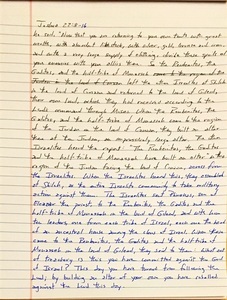
Joshua 22:8-16
Synopsis Joshua 22:8-16 5/23/2018
Having been dismissed by Joshua, the warriors from the tribes of Reuben, Gad and Manasseh began their return home. As they did, Joshua reminded them to share the great haul of booty they had acquired in the conquest with their neighbors who remained behind in their homeland.
On the return trip, as the warriors crossed back over the Jordan to return to their homes, they decided to build a monument. They chose to build a replica of the altar as a memorial of their participation in the conquest.
The Tendency Toward Nostalgia
The conquest was over. The shouts of joy and exaltation had died down. The feasting and celebrating was finished. It was unavoidable. It was time to go home.
But for the three eastern tribes, going home meant a separation from the strong sense of unity they had experienced during the conquest. Their sendoff and the return trek served as poignant reminders that, in choosing to live in the land east of the Jordan, they had chosen to be separate from the rest of the Israelites.
But in those moments of ending and of separation, they found themselves desiring that the feelings of unity and purpose would continue. It was a nostalgia for the exhilarating glory days of unity and purpose. It was an uncertainty they would ever experience anything like it again.
Nostolgia Lost – Living in the Present
It’s the way we are. When the good times are “rolling”, we don’t want them to stop. Maybe it was a great fellowship where a friend shared a profound insight. Or, perhaps some epiphany of understanding came in the midst of a particular mass. Or, maybe it’s the strong sense of worshipful fraternity in the midst of a praise and worship service.
I don’t want it to end.
It has to end. I know it has to end. My rational self understands that it’s time to go home. But my emotional sense of appreciation and value is so engaged that letting a good time end is painful. I don’t want it to end. I want the feelings to continue.
It’s a trap. It’s a bad habit. To not want to get off the mountaintop – to not want to come down from the mountain – is to misunderstand the mountain and it’s moment.
Every moment of my life is rich. Every second of my life is pregnant with the possibility of faithfulness. If I choose, I can rejoice as much in coming down the mountain as I did going up – not because of the afterglow – but because each moment could glow on its own.
“[To him] Jesus said, “No one who sets a hand to the plow and looks to what was left behind is fit for the kingdom of God.” Luke 9:62
Faithfulness Is the Key to Commitment
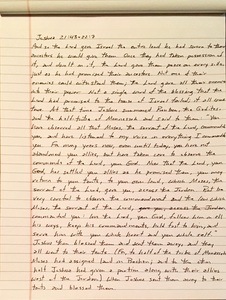
Joshua 21:43-22:7:
Synopsis Joshua 21:43-22:7 5/22/2018
It took several years to achieve the primary conquest of the Promised Land. However, once the children of Israel had taken possession of the land, they had peace. None of their neighbors bothered them.
So, at the completion of this initial conquest, Joshua sent the warriors from Reuben, Gad and Manasseh back to their own homes east of the Jordan River. As he did, he blessed them and admonished them to remember to love and serve the Lord.
Years of Faithfulness
The Reubenites, Gadites and Manassites who been given land east of the Jordan had been faithful to fight with the other tribes through the conquest of the Promised Land. Just as they had promised, they remained under Joshua’s authority until they were dismissed.
Faithfulness Is the Key to Commitment
“It’s a promise – I will do it.” That’s the talk. That’s how I talk.
But then there’s that expression, “Talk is cheap”. It’s funny, because talk really is cheap. It’s everywhere. The air is filled with claims about what has been and what should be.
But then there’s this special thing – a promise. If it’s kept then it forces me to change my behavior. It causes me to do differently. I have to chose faithfulness. Not just once. I have to choose faithfulness over and over and over.
A life-long promise is a daily choice.
The tribes remained faithful and were blessed. They chose to be faithful daily.
You will remain faithful and you will be blessed. It’s a choice you will make today.
“The trustworthy will be richly blessed; but whoever hastens to be rich will not go unpunished” Prov 28:20
The Priesthood Isn’t Free
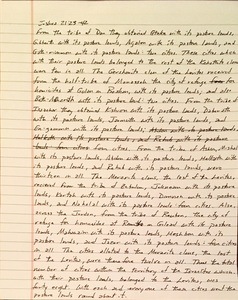
Joshua 21:23-42
Synopsis Joshua 21:23-42 5/21/2018
The Gershonite clan came from the tribe of Levi. Because none of the Levites received territory in the Promised Land, they all ended up living in cities within the territory of the other tribes. So, the Gershonites received cities from the tribe of Manasseh, including the sanctuary city of Golan.
After the Gershonites received their cities, the Merarites, the final clan of Levites, received cities from the tribe of Zebulun. As a result, the total number of cities given over to the the Levites from all of the other tribes was forty-eight.
The Priesthood Wasn’t Free
Moses introduced the Israelites to a system of worship that required the labor of approximately one-tenth of the population. So, about one out of every ten Israelites functioned in full-time paid ministry. The people valued and willingly invested in the keeping the ministry strong.
The Priesthood Isn’t Free
What’s necessary for the Authentic Community to survive today? It takes two things: People willing to be wholly devoted to ministry as priests, religious and other full time ministers, and the natural commitment to support from all community members.
In the Authentic Community, support for ministry is a component of God’s covenant with us. God makes a claim on a portion of the goods that come to us as a result of our labor. Historically, this has never been understood as optional. It is a component of the economy of redemption. Somehow contributing to the good of the Authentic Community can’t be legitimately separated from the experience of salvation.
“You pay tithesof mint and dill and cummin, and have neglected the weightier things of the law: judgment and mercy and fidelity. [But] these you should have done, without neglecting the others.” Matt 23:23
Authentic Community and Synthetic Community
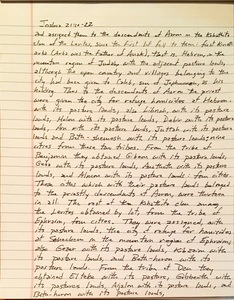
Joshua 21:10-22
Synopsis Joshua 21:10-22 5/20/2018
Aaron, the first high priest, came from the tribe of Levi called the Kohathites. The lots were cast at Shiloh, before the Lord to determine which clan of Levites would receive cities from the various tribes.
As a sub-clan of the Levites, the priests were given cities within Israel. Specifically, the lot cast for the priests gave cities from the southern tribes of Judah, Simeon, and Benjamin. This included Hebron, which was a city of refuge.
For the rest of the Kohathites, the lot fell on the tribes of Ephraim, Dan and Manasseh. These included Schechem, which was also a city of refuge.
Tension Between Judah and Ephraim Again
Once again, the tension between the two tribes vying for primacy was evident. Ephraim was associated with the Kohathites but Judah was associated with the priests themselves. With the casting of the lots, it was determined that priests would live in Judah and the southern tribes, while the next closest ministers of the tabernacle would come from Ephraim and the northern tribes.
The nation and the faith tradition could proceed without the Kohathites but could not proceed without the priests. So having the generations of priests come from the towns of a particular tribe was an honor and also a political asset. Judah had received this asset. So much so that Caleb was even willing to give up the city that he had personally defeated in order to host the priestly line.
Though it’s not expressed here, the fact that generations of priests were so closely associated with Judah contributed to a solidifying of the power structures of the newly found nation.
Authentic Community and Synthetic Community
People make promises. People make contracts. So it’s no surprise that people make the political and social contracts that regulate the behavior of communities. But the challenge of every social contract is that it is based on consensus and consent. A group of people more or less agree to be governed in a certain manner and that’s it. There is no basis in scientific reason. Social contracts are essentially no more that the arbitrary preference of a group of people.
The Authentic Community is essentially different. It is based on the revealed claims of God about how human beings should live. They are claims about reality – the real and non-optional nature of human beings. And also they focus on what is really good in the course of community behavior.
Though philosophical opposites, these two ways of living are easily confused and curiously interrelated. So much so that the one can almost not exist without the other. “Almost” that is – until all Christ followers begin to enter into the real and full possibility of life.
“who has made us into a kingdom, priests for his God and Father, to him be glory and power forever [and ever]. Amen” Rev 1:6
Binding the Nation Together through the Priesthood
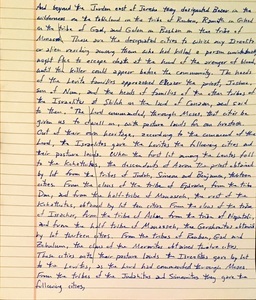
Joshua 20:8-21:9
Synopsis Joshua 20:8-21:9 05/19/2018
The Levite families approached Joshua, Eleazar the priest and the heads of the tribes. They reminded them of Moses’ command. Although the Levites were to receive no territory, they were to receive cities distributed throughout the nation where they could live. The tribes headed their requests.
The tribes of Judah, Simeon and Benjamin gave cities to the priests. Ephraim, Dan and Manasseh gave cities to the Kohathites. The tribes of Asher, Issachar and Manasseh gave cities to the Gershonites. And the tribes of Reuben, Gad and Zebulun gave cities to the Merarites.
Binding the Nation Together Through the Priesthood
Besides their ancestry, the thing that all of the tribes had in common was that the Levites lived among them. Every tribe hosted the men in specially designated cities who performed ritual services before the Lord at Shiloh. As a result, everyone was connected back the tabernacle and the common faith tradition in this way.
You Are the Salt of the Earth
Distributing the priests throughout the nation reinforced the visible institution that most gave the people their national sense of identity. The diaspora had a similar effect in that it spread Judaism and the knowledge of God abroad through other nations without the Jews losing their identity. As Christianity grew, it had a similar effect. Over the course of history, Christians have sometimes been both repressed and accepted. However, to the extent that Christians lived in a faith-filled way, they were almost always a light to others. The Authentic Community is a stabilizing influence and a challenge to the moral standards of the day.
Our role, in this respect, remains unchanged. My calling is to be salt and light to a people who have lived in an utter darkness concerning God. Not only in ignorance of God, but in the charred-over fallacy that there is no God.
I have fallen short. Too often my life doesn’t challenge – it doesn’t contradict the values of the world. And yet, even as I discovered in my own tortuously long return to the faith, there is a steadiness in the body of believers that beguiles critique and engenders a need to make sense of what it is that drives people to worship God.
This is all God needs to speak into a life. All He needs from me – faithfulness.
Because you have kept my message of endurance, I will keep you safe in the time of trial that is going to come to the whole world to test the inhabitants of the earth. Rev 3:10
The Challenge and the Calling of Life in the City of Refuge
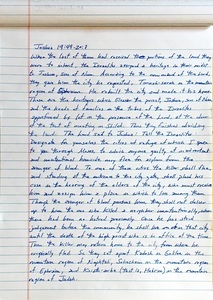
Joshua 19:49-20:7
Synopsis 19:49-20:7 5/18/2018
After the distribution of land to all the tribes, the Israelites assigned Joshua his own portion of land within the tribe of Ephraim. So, he was given a mountain village named Timnah-serah.
As prescribed by Moses, now that the Israelites were installed in the land, the leaders identified the three cities of refuge. These were Kadesh in Naphtali, Schechem in Ephraim, and Kiriath-arba in Judah.
The Community of the City of Refuge
The city of refuge process wasn’t automatic. The unintentional killer asked for refuge at the city gate. The community leaders scrutinized the unintentional killer. They verified a lack of malice. They offered asylum. The community took on the cost of this burden. And asylum had this implication: the city was responsible to provide a place and a living for the refugee.
The Challenge and the Calling of Life in the City of Refuge
So all these people who have made mistakes – deadly mistakes – remain in this special city. Because of their errors, they sit and wait for the death of the high priest. They remain where they are protected. They remain in a place where the legitimate demands of justice cannot touch them. This City of Refuge is the place where they are accepted and supported and defended.
Of course, the modern City of Refuge is the church. It is the faith community of Christ-followers. Ours is the place of protection and provision. Regardless of wherever a person has come from; we accept. We love. People remain in our care knowing that only with the death of the high priest will they be fully redeemed. So we protect and defend and support those who deserve none of it – even as we deserved none of what we have been given – until they realize the full possibility of their lives in the death and resurrection of Jesus Christ.
That’s the challenge and that’s the call.
He replied to him, “Amen, I say to you, today you will be with me in Paradise.” Luke 23:43
Fighting for More Living Space

Joshua 19:29-48
Synopsis Joshua 19:29-48 5/17/2018
The lot was cast for the sixth position which was awarded to the tribe of Naphtali. This was an extensive tract of land to the north. The lots were cast a seventh and final time giving a smaller tract of land to the tribe of Dan. This land bordered the sea coast and included the city of Joppa.
The Danites concluded that the tract was not large enough to accommodate the tribe and so marched to the city of Leshem, which they sacked and then repopulated.
The Need for More Land
The tribe of Dan recognized fairly quickly that their tribal territory wasn’t adequate to provide for all the members of the tribe. As a result, they expanded their own territory through conquest.
Fighting for More Living Space
Nowadays, it’s not really about the physical space – at least when I think about how this all works for me. It’s about garnering the freedom to enter into the possibility of my life.
The evidence suggests that it’s going to be a fight to get free. The apostle St. Paul said, “I have competed well; I have finished the race; I have kept the faith.” (2 Tim 4:7) It was work. He didn’t get the freedom to enter into his genius by sitting around waiting for it to happen. He acted.
We need action.
I need to act.
“until we all attain to the unity of faith and knowledge of the Son of God, to mature manhood, to the extent of the full stature of Christ” Eph 4:13
The Silent Birth of Glory

Joshua 19:9-28
Synopsis Joshua 19:9-28 5/15/2018
This scripture completes the description of the territory that was given to Simeon. Also described is the territorial boundaries given to the tribes of Zebulun, Issachar and Asher.
The Silent Birth of Nations
It’s just a couple of paragraphs in an infrequently visited corner of the scripture. Yet, three new nations are born. Like ancient stars in a remote galaxy, all are destined to burn bright as a part of the kingdom of Israel – but they will be infrequently known by name.
The Silent Birth of Glory
It’s a quiet morning, or hectic and harried afternoon. God calls you and you answer Him. You are born again. Water baptism, holy spirit, a new creation. Essentially changed. Forever different. The old has passed away and the new has been raised to life.
And nobody notices. Like Isaac of old, your life is quiet faithfulness. Your day comes and goes and hardly a handful have perceived your change – your new birth. Fewer still have inquired. Like a star that cannot understand its own glory, you wonder at how no one seems to pay attention.
What you will be no one seems to know right now. But if you are faithful, the glory of God will work in you to change everything.
Now to him who is able to accomplish far more than all we ask or imagine, by the power at work within us, to him be glory in the church and in Christ Jesus to all generations, forever and ever. Amen Eph 3:20
Love Is Not Easily Offended

Joshua 18:16-19:8
Synopsis Joshua 18:6-13 5/10/2018
The boundary for Benjamin was established between the territory of Ephraim and Judah. Next was the establishment of the territory of the tribe of Simeon, whose boundaries were completely encapsulated by the territory of Judah.
The land was given in this way because the tribe of Judah had received “too much for them”.
It’s Too Much for Judah
It’s kind of strange. Thirty-six men – three from each tribe – go out to survey the remaining uncommitted territory in the Promised Land. They all somehow agree that Judah had been given too much territory in the first lottery. So, they created a parcel in the middle of the Judahite territory. When they returned to Joshua at Shiloh, he cast lots for the territory and the land was given to the tribe of Simeon.
This, just after Ephraim and Manasseh had appealed to Joshua to give them more land? Yet Judah was silent.
Love Is Not Easily Offended
We live in a world where so many people, regardless of their point of view, seem to be offended – as though carrying an offense was a sure sign of moral rectitude. I’m not saying that anyone should be indifferent to the moral failings that plague our society. I’m not suggesting that anyone turn a blind eye to the real injuries that we human beings tend to inflict on one another.
But I am saying that when I find myself indignant because someone has done something against me, that it is really hard to express love to that person. So, like a wise man once said, “Drop the matter before a greater dispute breaks out.”
it is not rude, it does not seek its own interests, it is not quick-tempered, it does not brood over injury 1 Cor 13:5
